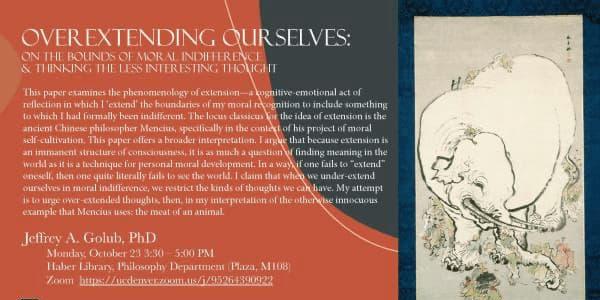Philosophy Asks the Ultimate Questions
Interested? Request more information
Credit hours for Major: 36 (consult Undergraduate Advisor)
Full-time, part-time
On-campus with some online courses available
Start terms: fall, spring, summer
Philosophy calls on both your creativity and your rigor. As a student of philosophy, you will become skilled at:
Evaluating Arguments—Learn to distinguish between good and bad arguments, irrespective of their subject matter, to be able to make informed decisions and recommendations on contentious issues.
Clarity of Thought and Reasoning—Separate distinct issues, consider them independently and evaluate the consequences of positions on them.
Advanced Communication—Frame, express, and convey ideas to precisely articulate your position using both oral and written communication.
Breadth and Diversity of Vision—Appreciate new and confronting ideas and value different perspectives on life, society, and knowledge.
These skills help you make decisions, weigh evidence, assess opinions, contemplate mysteries, understand the world, and live a thoughtful life. Philosophy allows you to explore possibilities by broadening your world perspective and developing a critical lens.
Philosophy provides an excellent foundation for almost any professional field, covering subjects such as:
- ethics and politics
- art and literature
- history and religion
- technology
- the sciences
Philosophical training helps prepare students for success across many fields: law, medicine, software development, business, public service, and more. Read "Beyond the Academy" from the American Philosophical Association or listen to "Wisdom at Work" (podcast) to learn more.
College classes teach many facts; philosophy goes beyond facts, teaching to analyze, write, and speak clearly about those facts. The benefits last a lifetime, preparing you for further self-development, intellectual growth, and creative, responsible action.
Progam features
Honi F. Haber Memorial Library
Students have access to the Honi F. Haber Memorial Library, an extensive philosophy library located in the department, dedicated to our beloved former faculty member, Honi Haber, PhD.
Engaged Faculty
Faculty are engaged scholars who enjoy connecting with you to explore new perspectives and ideas. Our department is pluralistic, meaning faculty research specialties span across a wide range, including Ancient, Continental, Analytic, Feminist, and American approaches. Faculty also research and teach philosophically on topics such as addiction, aesthetics, animal ethics, artificial intelligence and technology, economics, literature, politics, religion, and more.
Because a proper understanding of historical context is basic to more specialized work in philosophy, every faculty member teaches regularly at the introductory level.
Choose Your Journey
Philosophy recently eliminated the "categories of requirements" approach to the B.A. Now, Philosophy majors can choose their own journey through our diverse curriculum. Below, we present five model journeys, not as requirements, but as ways thematize your journey:
The Ethics and Values Journey focuses upon the nature of morality, justice, relationships, and the components of a good life.
Explore the Journey of Philosophical Traditions for exposure to the multiplicity of cultures around the world, and their expressions in the 21st century.
Those interested in consciousness, knowledge/learning, and psychology can benefit from the Mind and Consciousness Journey as they explore relationships between mind and world.
How do large-scale social, scientific, and technological structures inform our everyday lives? Try the Science, Technology, and Knowledge Journey.
Concerned to create a more equitable and just world? Use the Social Justice, Politics, and Diversity Journey to examine the political, economic, religious, and technological institutions and practices that structure collective life.
These journeys are further described in the curriculum section.
Careers
Philosophy offers many career options
Research different degrees and career trajectories at DataUSA.io
(Screenshot—July 2024)
Philosophy is an excellent foundation for most professional fields. Philosophical inquiries can cover a wide range of subject matter including ethics and politics, art and literature, history and religion, technology, and the sciences.
A degree in philosophy is excellent preparation for:
- Law
- Medicine
- Software development
- Journalism and Media
- Government and Public Administration
- Education and Research
Curriculum
The BA in Philosophy allows you maximum flexibility to be able to choose your own journey through our diverse curriculum. The Undergraduate Advisor can provide details about minimum numbers of upper division credits required for the Major.
Majoring in Philosophy: 36 hours
All philosophy majors typically begin by engaging introductory philosophy courses in:
- truth and reality (PHIL 1012)
- ethics and logic (PHIL 1020 or 2441)
- scientific reasoning (PHIL 2441 or PHIL 2510)
Journeys
After these lower division courses, students can choose their own path. Many utilize one of five model Journeys to thematize their learning in philosophy.
Ethics and Values
Perhaps one of the most distinctive characteristics of human beings is that our existence is completely entangled with ethical norms and values that fundamentally change our minds and the direction of our lives. This journey will explore the nature of morality, how people should relate to others, and what is involved in having a good life.
Philosophical Traditions
There are multiple philosophical traditions—reflecting the multiplicity of cultures around the world—and some of these philosophical traditions have lasted for millennia. But how do these traditions of thought bear on us today in the 21st century? Are they not traditions to be interrogated, challenged, and taken in the new directions? This journey offers you the opportunity to develop critically by engaging the great thinkers of the past for the sake of opening up new pathways of thinking in the future.
Mind and Consciousness
The study of what our minds are and how they work is fundamental to our understanding of both ourselves and our world. This journey seeks to help you explore the many relationships between our individual minds and the world.
Science, Technology, and Knowledge
Science and technology inform every aspect of our lives, changing both how we act and what we know. Too often, we do not critically assess these large social structures. This journey teaches you (a) the nature of knowledge, (b) our tools for thinking (physical, mental, and symbolic), and (c) the larger social, scientific, and technological structures built upon these fundamentals.
Social Justice, Politics, and Diversity
Are you interested in creating a more equitable and just world? The courses included in this journey examine the political institutions and social practice that structure our collective life, questions regarding our social and ethical responsibilities for justice and equality, as well as systems of power and domination at the intersection of gender, race/ethnicity, class, sexuality, and disability. In this journey, you will develop analytical skills, critical thinking, cultural sensitivity, and political awareness.
Whatever educational journey you choose, the BA in Philosophy will guide you in cultivating the necessary skills for articulate oral and written communication, clear thinking and reasoning, and drawing connections among ideas of all kinds.
Minors in Philosophy
Philosophy majors or Non-DEGREE majors can add a minor to your degree by completing at least 15 hours of specified coursework. You will need to see your CLAS advisor to declare a minor.
There are three minors: Philosophy, Ethics, and Philosophy of Science. All three are described and linked to the CU Denver Catalog on our Minors page.
Philosophy minor
Topics may include:
- Introduction to philosophy
- Ancient Greek Philosophy
- Modern Philosophy
- Logic and Critical thinking
- and more
Philosophy of Science minor
Topics typically include:
- Language, Logic, & Scientific Reasoning
- Investigating Nature
- Philosophy of Science
- and more
Ethics Minor
Topics may include:
- Ethics and Society
- Business Ethics
- Environmental Ethics
- Bioethics
- and more
Add a Masters in Humanities to your Bachelor degree in as little as one extra year (4+1)
Save time and tuition while expanding your career opportunities at the same time by enrolling in the Philosophy (BA) + Master’s in Humanities (MH degree, Philosophy and Theory Track) program.
Benefits include
More career opportunities: Some career paths require that job candidates hold advanced degrees. Completing the BA + MH program allows you to apply for higher level positions more quickly, providing an advantage in a competitive job market.
Saves time: Combining the Bachelors and Masters programs allow you to complete your undergraduate and graduate studies quickly, typically within five years instead of six or more.
Cost: A shorter timeline to complete a Master’s Degree in Humanities means less tuition, fees, and related educational expenses.
Teaching assistantships: The Department of Philosophy may offer you, as a qualified MA student, research, or teaching assistantships. Combining the BA and MH degrees may allow you to access these opportunities.
Faculty: Combining the BA and MH degrees allows you to continue to take courses at the graduate level from the same familiar, award-winning, and caring faculty members.
Learning outcomes
- Recognize and comprehend the salient elements of philosophy's significant historical figures, periods, and areas.
- Understand how philosophical frameworks and theories expand the meanings and implications of existing cultural areas (e.g. those found in science technology, the arts, politics, medicine, social justice.)
More specifically, the above includes training (most typically in writing) about how to:
- Interpret texts by careful reading and synthesis of meanings.
- Identify and criticize philosophical arguments.
- Develop original arguments supported by texts and logical reasoning.
- Outline major philosophical frameworks.
Tuition
The cost of tuition for the Bachelor of Arts (Ba) in Philosophy is different for in-state and out-of-state students. See the link for the current table of rates.
Residents of Western Interstate Commission for Higher Education (WICHE) states may qualify for reduced tuition rates. The Western Undergraduate Exchange (WUE) program requires students to maintain current residency in WICHE state until degree completion.
Scholarships
Each year, CU Denver undergraduate students are awarded over $30 million in scholarships from institutional, local, state, and national sources. Learn more, and apply here.
Other opportunities
The department of Integrative Biology and other departments have paid positions (both in the work-study program and outside of it) which may include jobs as graders, teaching assistants, and learning assistants. Please expect to have to apply. Learn more here.
Admission Requirements
If you are an incoming freshman to CU Denver (in-state, out-of-state, and international applicants), you can apply through either the Common Application or the Milo Application. Transfer students will need to submit the Milo Application.
Incoming first-year students
CU Denver requires that students complete the Colorado Higher Education Admission Requirements (HEAR). You will not have to meet all Minimum Academic Preparation Standards (MAPS) for admission, but you will need to complete CU Denver coursework by graduation.
Transfer Students
We have strong connections with other four-year and community colleges. If you have completed more than 24 credits of transferable coursework, you will be evaluated for admission on the basis of your college GPA without regard to your high school performance. If you have fewer than 24 credits, you will be evaluated based on both your high school and college GPAs. For more information and to plan your transfer, see transfer admissions in the admissions office.
If you are in your first or second semester at one of the participating Colorado community colleges and plan to transfer to CU Denver after earning your associate degree, CU Denver Bridge to Bachelors might be a great program for you. To qualify, you must meet the criteria including meeting regularly with your assigned CU transfer advisor while you are attending community college.
International Students
You will need to begin your application through the Office of International Affairs. They will help you manage your application process.
Application deadlines
Spring
Domestic Application: January 1
International Applications: Priority is September 15, and Final is October 15
Summer
Domestic Applications: May 15
International Applications: Priority is January 15, and Final is March 15
Fall
Domestic Applications: August 1
International Applications: Priority is March 15, and Final is May 15
Philosophy in the news
In the news
- Ai Ethics In Action: David Hildebrand Shares CU Denver Philosophy Insights Across The U.S. And Europe
- Philosophy Department Pioneers CU Denver’s First AI Ethics Course: Shaping Thoughtful Innovators
- Redefining the Healthcare Frontier: How Lee Tafoya, CU Denver grad in Psychology and Philosophy, Is Engineering the Future of Patient-Centered Innovation
- Philosophy and CFDA Organize Campus-Wide Conversation about AI and Education

Inclusion is our value
CU Denver is home to one of the most diverse student populations in Colorado.
- Join your choice of 100+ student groups and organizations which support your identity and interests
- Your department and faculty are committed to the pursuit of equity and inclusion in the classroom, lab, and beyond
- Learn more at our Office of Diversity, Equity, and Inclusion

Find your people
Campus can feel like a huge place. We help you find your people by offering the experience of a more traditional, small liberal arts program—for a fraction of the cost. We offer a variety of clubs and networking opportunities.

Alumni Profile: Lauren Davison
After receiving her BA in Philosophy from CU Denver, Lauren Davison received her JD from the University of Denver Law School. After law school, she completed two judicial clerkships, first at the Colorado Court of Appeals and second at the Colorado Supreme Court. She is currently an Assistant Attorney General at the Colorado Attorney General’s Office.





